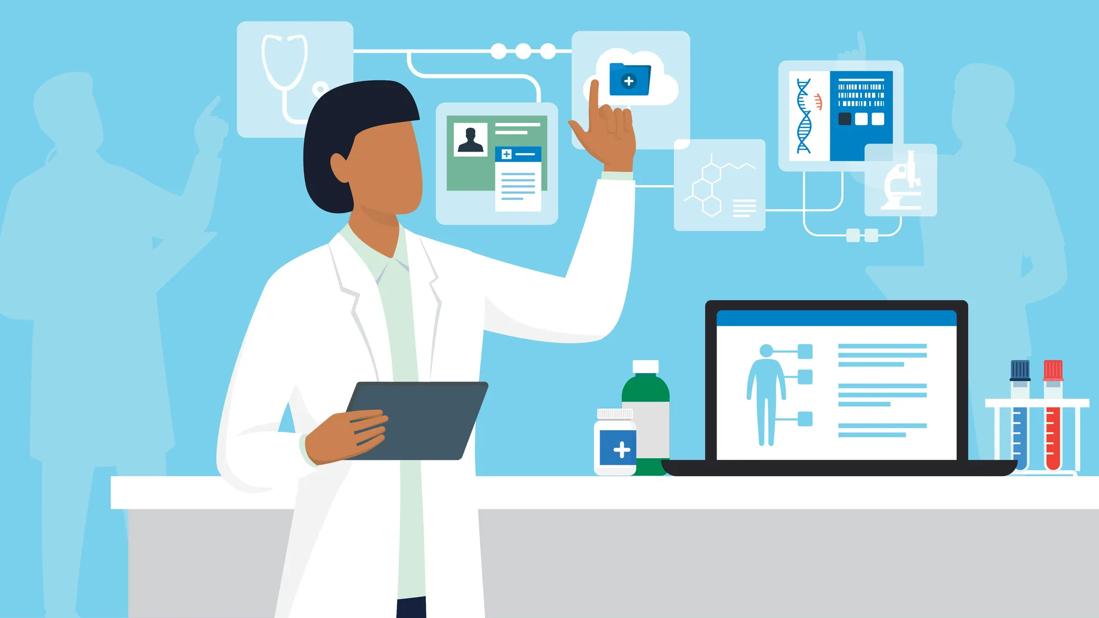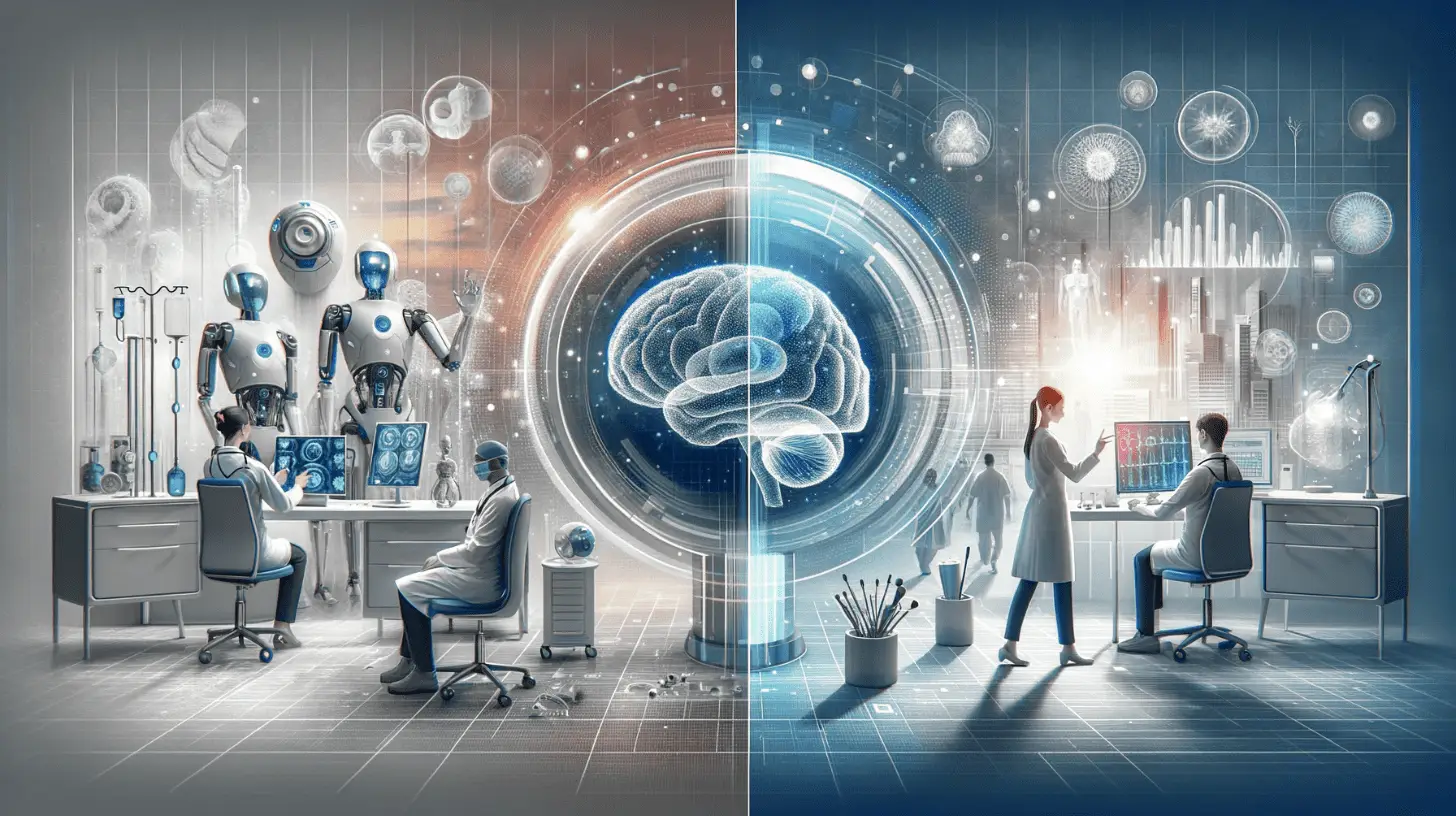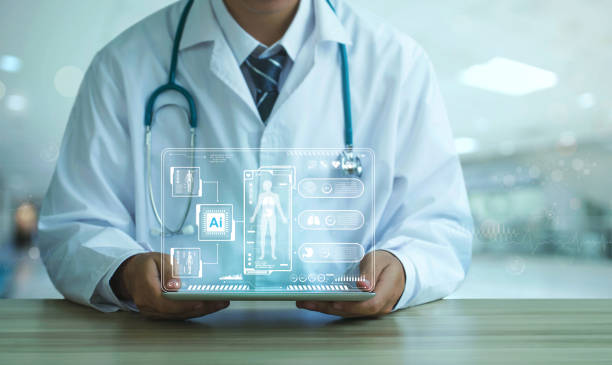Artificial Intelligence (AI) is transforming healthcare. It’s changing how we diagnose, treat, and manage diseases.
AI is making waves in healthcare by enhancing patient care. It helps doctors make quicker, more accurate decisions. Imagine a world where early disease detection is a norm. AI can analyze vast amounts of medical data faster than any human.
This means better treatment plans for patients. Healthcare professionals can spend more time with patients and less time on paperwork. Plus, AI can predict outbreaks and help in managing pandemics. The fusion of AI and healthcare is not just a trend. It’s a game-changer, offering hope for a healthier future. Let’s explore how AI is reshaping the healthcare landscape and what it means for all of us.

Ai In Diagnostics
Artificial Intelligence (AI) is transforming healthcare by enhancing diagnostic accuracy and speed. AI in diagnostics is a groundbreaking development. It leverages advanced technologies to analyze data, recognize patterns, and provide insights. This integration improves patient outcomes and supports healthcare professionals in making informed decisions.
Image Recognition
AI in diagnostics uses image recognition to analyze medical images quickly and accurately. This technology helps radiologists and other specialists by identifying abnormalities in X-rays, MRIs, and CT scans. Medical Imaging Analysis powered by AI can detect diseases like cancer, fractures, and neurological disorders earlier than traditional methods.
Key benefits of AI in image recognition:
- Faster diagnosis
- Higher accuracy
- Reduced human error
For instance, AI algorithms can scan thousands of images in seconds, highlighting areas of concern. This process aids in early detection and treatment, which is crucial for diseases like cancer. Radiologists use these AI tools to confirm their findings, ensuring no detail is overlooked.
Table showcasing AI applications in image recognition:
| Application | Benefit |
|---|---|
| Cancer Detection | Early and accurate identification |
| Bone Fracture Analysis | Quick assessment and treatment |
| Neurological Disorder Detection | Improved diagnosis and management |
AI in diagnostics, through image recognition, is reshaping the landscape of Medical Imaging Analysis. It ensures timely and precise diagnostics, ultimately enhancing patient care.
Predictive Analytics
Predictive analytics is another powerful aspect of AI in diagnostics. It uses vast amounts of data to predict patient outcomes and disease progression. By analyzing Electronic Health Records and other data sources, AI can identify trends and provide valuable insights.
Key benefits of predictive analytics in healthcare:
- Personalized treatment plans
- Proactive patient care
- Improved resource allocation
AI-driven predictive analytics can forecast patient health trends, allowing for early intervention. For example, it can predict the likelihood of chronic disease development, enabling preventative measures. Healthcare Data Analysis tools use AI to identify risk factors and suggest personalized treatments.
Table showcasing AI applications in predictive analytics:
| Application | Benefit |
|---|---|
| Patient Outcome Prediction | Better treatment planning |
| Chronic Disease Management | Early intervention and monitoring |
| Hospital Resource Management | Efficient use of resources |
AI in diagnostics, through predictive analytics, empowers healthcare providers. It enables them to make data-driven decisions, improving patient outcomes and operational efficiency.

Personalized Treatment
Artificial intelligence (AI) is transforming healthcare in many ways. One of the most exciting developments is personalized treatment. AI enables doctors to customize treatment plans for each patient. This approach considers individual differences in patients’ genes, environments, and lifestyles. Personalized treatment leads to better outcomes and improved patient satisfaction.
Data-driven Decisions
AI makes data-driven decisions possible. In healthcare, vast amounts of data are collected from various sources. These include electronic health records, lab results, and wearable devices. AI processes this data quickly and accurately. This capability is known as Healthcare Automation.
With Predictive Analytics, AI can forecast disease outbreaks and patient outcomes. This helps doctors make better clinical decisions. Clinical Decision Support systems provide real-time assistance to healthcare providers. They offer recommendations based on the latest medical research and patient data.
Here is a table showing the benefits of data-driven decisions in healthcare:
| Benefit | Description |
|---|---|
| Improved Accuracy | AI analyzes data more accurately than humans. |
| Faster Diagnosis | AI speeds up the diagnostic process. |
| Better Treatment Plans | AI helps create personalized treatment plans. |
AI Diagnostics and Health Informatics play a crucial role. They help in the early detection and treatment of diseases. AI systems can identify patterns and anomalies that may be overlooked by human eyes.
Overall, data-driven decisions lead to more efficient and effective healthcare. This benefits both patients and providers.
Tailored Therapies
AI enables the creation of tailored therapies. These are treatments designed specifically for individual patients. Personalized Medicine is a key aspect of this approach. It involves using genetic information to guide treatment decisions.
For example, AI can analyze a patient’s genetic data to determine the best drug for their condition. This reduces the risk of adverse reactions and increases treatment effectiveness. Telemedicine Technology also plays a role in delivering tailored therapies. It allows doctors to monitor patients remotely and adjust treatments as needed.
Here are some advantages of tailored therapies:
- Customized Treatment Plans
- Reduced Side Effects
- Improved Patient Outcomes
- Efficient Use of Resources
Patient Data Management is essential for tailoring therapies. AI helps manage and analyze patient data efficiently. This ensures that the right information is available at the right time.
Artificial Intelligence In Medicine and Machine Learning In Healthcare make these tailored therapies possible. They analyze vast amounts of data to find the best treatment options. This leads to more precise and effective healthcare solutions.
Tailored therapies represent a significant advancement in medical treatment. They improve patient care and lead to better health outcomes.
Virtual Health Assistants
Artificial Intelligence in Healthcare is transforming the way we approach patient care. One of the most exciting advancements is the use of Virtual Health Assistants. These AI-driven tools are designed to support patients and healthcare providers by offering timely, personalized assistance. From managing appointments to providing medical information, Virtual Health Assistants are becoming indispensable in modern healthcare.
Chatbots
Chatbots are a common form of Virtual Health Assistants. They use Natural Language Processing in Healthcare to understand and respond to patient queries. Chatbots can provide information on symptoms, medication, and general health advice. They are available 24/7, making healthcare more accessible.
Here are some key benefits of healthcare chatbots:
- Healthcare Automation: Streamlining administrative tasks like scheduling appointments.
- Telemedicine Solutions: Offering quick consultations and advice without the need for in-person visits.
- Predictive Analytics: Analyzing patient data to predict potential health issues.
A typical interaction with a healthcare chatbot might look like this:
| Patient Query | Chatbot Response |
|---|---|
| What should I do if I have a fever? | It is important to rest and stay hydrated. If your fever exceeds 102°F, contact a doctor. |
| Can you help me schedule a doctor’s appointment? | Sure, please provide your preferred date and time. |
Remote Monitoring
Remote Monitoring is another critical application of Virtual Health Assistants. It allows healthcare providers to track patients’ health outside of traditional clinical settings. This is especially useful for chronic disease management and post-operative care.
Key features of Remote Monitoring include:
- Patient Data Management: Collecting and organizing patient health data.
- Machine Learning in Medicine: Analyzing data to provide personalized medicine recommendations.
- Health Informatics: Integrating data from various sources for a comprehensive view of patient health.
Remote Monitoring devices often track:
| Health Metric | Device |
|---|---|
| Blood Pressure | Wearable Blood Pressure Monitor |
| Glucose Levels | Continuous Glucose Monitor |
| Heart Rate | Smartwatch |
These devices send data to healthcare providers in real-time. This enables quick interventions if necessary. Virtual Health Assistants analyze this data using Artificial Intelligence in Healthcare. They provide actionable insights, improving patient outcomes and reducing hospital visits.
Ai In Drug Development
Artificial Intelligence (AI) is reshaping the healthcare industry. One key area is drug development. AI helps create new drugs faster and more efficiently. This process involves many stages, from research to clinical trials. AI makes each step smoother and quicker. Let’s dive into how AI impacts drug development.
Accelerated Research
AI speeds up research in drug development. Traditionally, finding a new drug can take years. AI can reduce this time significantly.
Here are some key benefits:
- Data Analysis: AI analyzes large data sets quickly. This helps find patterns and connections that humans might miss.
- Predictive Models: AI creates models to predict how new drugs will behave. This helps narrow down the best candidates for further testing.
- Molecular Design: AI designs new molecules that can become drugs. This process is faster than traditional methods.
Consider the table below for a quick comparison:
| Traditional Research | AI-Powered Research |
|---|---|
| Years to analyze data | Weeks or months |
| Manual pattern recognition | Automated, precise analysis |
| Limited molecular design | Extensive, rapid design |
In essence, AI makes research faster and more accurate. This leads to quicker development of new drugs.
Clinical Trials Optimization
AI also optimizes clinical trials. Clinical trials are essential for testing new drugs. They ensure safety and effectiveness. AI improves this process in several ways.
Key improvements include:
- Patient Selection: AI helps find the right patients for trials. It analyzes medical records and identifies suitable candidates.
- Monitoring: AI monitors patients in real-time. This ensures quick response to any issues.
- Data Management: AI manages trial data efficiently. This reduces errors and speeds up analysis.
For better understanding, see the benefits in the table below:
| Traditional Trials | AI-Optimized Trials |
|---|---|
| Manual patient selection | Automated, accurate selection |
| Delayed monitoring | Real-time, continuous monitoring |
| Data prone to errors | Efficient, error-free management |
Thus, AI makes clinical trials more efficient. This ensures faster drug approval and availability.
Patient Data Management
Artificial intelligence (AI) is transforming various sectors, and healthcare is no exception. A critical aspect of this transformation is patient data management. Efficient management of patient data is essential for accurate diagnoses, effective treatments, and enhanced patient care. AI tools are revolutionizing how healthcare providers collect, store, and utilize patient data, ensuring streamlined processes and improved outcomes.
Electronic Health Records
Electronic Health Records (EHRs) are a cornerstone of modern patient data management. EHRs provide a digital version of patients’ paper charts, making information readily accessible. This accessibility is vital for accurate and timely patient care.
AI is enhancing EHR systems in various ways:
- Healthcare Automation: AI automates data entry and retrieval, reducing human errors and saving time.
- Natural Language Processing In Health Records: AI can interpret and organize unstructured data, such as doctors’ notes, into structured formats.
- Clinical Decision Support Systems: AI-driven tools analyze EHR data to provide recommendations and alerts, aiding in clinical decisions.
A table illustrating the benefits of AI in EHRs:
| Feature | Benefit |
|---|---|
| Automated Data Entry | Reduces manual work and errors |
| Data Analysis | Provides actionable insights |
| Real-time Updates | Ensures current patient information |
With AI, EHRs become more than just data storage systems. They turn into powerful tools for predictive analytics in healthcare, aiding in early diagnosis and treatment plans. AI-driven diagnostics help in identifying patterns and predicting potential health issues before they become critical.
Data Security
Patient data security is a top concern in healthcare data management. AI plays a crucial role in ensuring the safety and privacy of sensitive patient information.
Key aspects of AI in patient data security:
- Threat Detection: AI algorithms detect unusual activities and potential security threats in real-time.
- Data Encryption: AI enhances encryption techniques, making it harder for unauthorized access.
- Access Control: AI monitors and controls who accesses patient data, ensuring only authorized personnel can view sensitive information.
A table showing AI’s impact on data security:
| Security Feature | Impact |
|---|---|
| Real-time Threat Detection | Prevents data breaches |
| Enhanced Encryption | Protects data integrity |
| Access Control | Ensures data privacy |
AI not only secures data but also ensures compliance with regulations. For example, it helps in adhering to laws like HIPAA, which mandates strict data protection standards.
Machine learning in medicine further strengthens data security by continuously learning and adapting to new threats. This dynamic approach is critical in a landscape where cyber threats constantly evolve.
With AI’s support, telemedicine and AI services can securely manage patient data across various platforms. This integration ensures that patient information remains safe, even when shared remotely.
Ai And Telemedicine
Artificial Intelligence (AI) is making waves in many fields, and healthcare is no exception. One of the most exciting areas is AI and telemedicine. Telemedicine uses technology to provide remote healthcare services, while AI adds a layer of intelligence to these services. This combination is transforming how patients receive care, making it more efficient and accessible.
Enhanced Consultations
AI enhances telemedicine consultations in several ways. Doctors can use AI to analyze patient data quickly and accurately. AI systems can review medical histories, lab results, and imaging studies. This helps doctors make informed decisions faster.
Here are some ways AI improves telemedicine consultations:
- Personalized Treatment Plans: AI can analyze large datasets to suggest personalized treatment plans based on individual patient data.
- Symptom Checkers: AI-powered symptom checkers can guide patients in understanding their symptoms before the consultation.
- Real-time Data Analysis: AI can process real-time data from wearable devices and other health monitors, providing doctors with up-to-date information.
Consider the following table for a quick comparison:
| Traditional Consultations | AI-enhanced Consultations |
|---|---|
| Manual data review | AI data analysis |
| Generic treatment plans | Personalized treatment plans |
| Limited real-time monitoring | Continuous real-time monitoring |
Accessibility Improvements
AI and telemedicine also make healthcare more accessible. Many people live in remote areas with limited access to healthcare services. Telemedicine bridges this gap by providing medical consultations through digital means. AI supports this by making the process more efficient.
Key improvements in accessibility include:
- Remote Diagnostics: AI can help diagnose conditions remotely, reducing the need for in-person visits.
- 24/7 Availability: AI-powered chatbots and virtual assistants can provide support at any time, ensuring help is always available.
- Language Translation: AI can translate languages in real-time, making it easier for non-native speakers to communicate with healthcare providers.
Here is a simple comparison:
| Issue | Solution |
|---|---|
| Remote location | Telemedicine consultations |
| Language barriers | AI translation |
| Limited hours | 24/7 AI support |
AI and telemedicine together are making healthcare more accessible to everyone, regardless of location or language.
Ethical Considerations
Artificial Intelligence (AI) is transforming healthcare. It promises better patient outcomes and more efficient care. But with these advancements come important ethical considerations. We must address these to ensure AI benefits everyone fairly and safely.
Bias In Ai
Bias in AI is a significant concern. AI systems learn from data, and if this data is biased, the AI will be too. This can lead to unequal treatment of patients. For example, if an AI system is trained mostly on data from one group, it may not work well for others.
Consider these key points about bias in AI:
- Algorithmic Bias: Algorithms may reflect human biases present in their training data.
- Predictive Modeling: Models might predict better outcomes for some groups over others.
- Clinical Decision Support: Biased data can lead to poor clinical decisions.
To address bias:
- Diversify training data to include all groups.
- Regularly audit AI systems for bias.
- Involve ethicists in AI development.
Bias in AI can have real impacts. It can affect patient outcomes and trust in healthcare systems. Ensuring Ethical AI requires constant vigilance and effort.
Patient Privacy
Patient privacy is another crucial issue. AI systems need access to large amounts of data, often from Electronic Health Records (EHRs). This raises concerns about data privacy and security.
Key considerations for patient privacy:
- Data Privacy: Ensuring patient data is protected from unauthorized access.
- Healthcare Analytics: Using patient data responsibly to improve care without compromising privacy.
- Natural Language Processing: Extracting information from text data while maintaining privacy.
To protect patient privacy:
- Implement robust encryption methods.
- Follow strict data access protocols.
- Educate staff on data privacy practices.
Balancing AI benefits with patient privacy is essential. It ensures trust and compliance with regulations. As AI in healthcare grows, maintaining strong privacy measures will be critical.
Future Trends
Artificial Intelligence (AI) is rapidly changing the healthcare industry. As technology advances, the future of AI in healthcare promises to be even more revolutionary. From improving patient care to streamlining administrative tasks, AI offers numerous possibilities. Let’s explore some of the future trends in this exciting field.
Emerging Technologies
AI is introducing new technologies that are transforming healthcare. These technologies include:
- Machine Learning Healthcare Applications: Machine learning helps analyze large datasets to predict patient outcomes and improve treatment plans.
- Healthcare Data Analytics: Advanced analytics can identify trends and patterns in patient data, leading to better decision-making.
- Clinical Decision Support Systems: These systems provide healthcare professionals with AI-driven recommendations for patient care.
- Natural Language Processing In Healthcare: NLP helps in understanding and analyzing clinical notes and medical records.
- Telemedicine And AI: AI enhances telemedicine by providing real-time diagnosis and treatment suggestions remotely.
- Predictive Analytics In Healthcare: Predictive analytics can forecast disease outbreaks and patient needs, improving preparedness.
AI-driven technologies are not just limited to patient care. They also enhance administrative tasks. For instance, Electronic Health Records Ai helps in managing patient records efficiently. This reduces errors and saves time. Additionally, Personalized Medicine Ai tailors treatments based on individual genetic profiles, leading to better outcomes.
Integration Challenges
Despite the promising future, integrating AI in healthcare faces several challenges:
- Data Privacy: Protecting patient data is crucial. Ensuring privacy while using AI is a significant concern.
- Interoperability: Different systems need to work together. Achieving this seamless integration is challenging.
- Regulatory Compliance: Healthcare is heavily regulated. AI systems must comply with existing laws and regulations.
- Cost: Implementing AI technologies can be expensive. Many healthcare facilities may find it hard to afford these advancements.
- Training: Healthcare professionals need to be trained to use new AI tools. This requires time and resources.
- Bias: AI systems can inherit biases from the data they are trained on. This can affect the accuracy and fairness of decisions.
A table summarizing these challenges is provided below:
| Challenge | Explanation |
|---|---|
| Data Privacy | Ensuring patient data is protected |
| Interoperability | Different systems working together seamlessly |
| Regulatory Compliance | Meeting existing laws and regulations |
| Cost | High expense of implementing AI |
| Training | Need for training healthcare professionals |
| Bias | Inherent biases in AI systems affecting decisions |
While these challenges are significant, the potential benefits of AI in healthcare are immense. Overcoming these hurdles will require collaboration between technologists, healthcare providers, and policymakers. The future of Artificial Intelligence In Medicine holds great promise for improving healthcare outcomes and efficiency.

Frequently Asked Questions
What Is Ai In Healthcare?
AI in healthcare refers to the use of artificial intelligence technologies to enhance medical practices, from diagnosis to treatment. It helps in improving patient outcomes and operational efficiency.
How Does Ai Improve Patient Care?
AI improves patient care by providing accurate diagnostics, personalized treatment plans, and real-time health monitoring. It enables faster decision-making and reduces human errors.
Can Ai Detect Diseases Early?
Yes, AI can detect diseases early by analyzing medical data and identifying patterns. This leads to early intervention and better prognosis for patients.
What Are The Benefits Of Ai In Healthcare?
The benefits of AI in healthcare include improved diagnosis accuracy, personalized treatment, efficient administrative processes, and reduced costs. It enhances overall patient care quality.
Conclusion
AI is transforming healthcare. It enhances patient care and improves diagnoses. Doctors get more accurate data. Patients receive personalized treatment plans. AI reduces errors and saves time. It’s clear that AI in healthcare offers great benefits. As technology advances, expect more innovations.
Embrace these changes for a healthier future.

